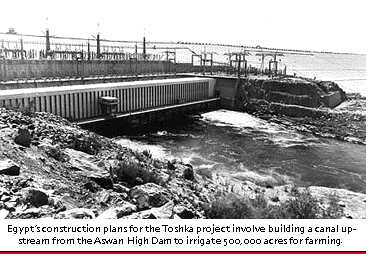
Ethiopia and Egypt aired their sharp differences on 26 February about
use of the Nile, the world's longest river.
Ethiopia is demanding a new deal on sharing Nile waters, while Foreign
Minister Amr Moussa dismissed claims that Egypt was diverting the natural
course of the river as "nonsense."
"First and foremost, Egypt will have to scrap the unfair 1959
agreement with Sudan on the utilization of the Nile waters which excluded
Ethiopia," Ethiopian Deputy Foreign Minister Tekeda Alemu told
reporters.
"This inequitable state of affairs cannot continue since the
upstream Nile riparian countries like Ethiopia will need their share of
the Nile waters to meet demands of their people," he added, shortly
after Moussa set out Egypt's position.
The two ministers spoke at separate news conferences in Addis Ababa
where they were attending a meeting of the Organization of African Unity
(OAU).
"Yes, Egypt is making use of the waters of the Nile. But charges
that Egypt had diverted the natural course of the river are pure
nonsense," Moussa said.
The 6,700 kilometer Nile drains into the Mediterranean. The Blue Nile,
which originates in Ethiopia, joins the White Nile from Lake Victoria at
the Sudanese capital Khartoum and flows onwards to Egypt.
Moussa said Egypt was willing to hold talks with Ethiopia to resolve
differences over the waterway.
"We should be able to meet so as to clear suspicions and
misunderstandings which may exist between our two countries," he
said, denying official Ethiopian claims that Egypt wants to alter the
course of the Nile.
Ethiopia is opposed to Egypt's planned construction of the Toshka
project, near the Sudanese border. It involves a canal to be built
upstream of the Aswan High Dam to irrigate 500,000 acres for farming.
Ethiopia wants all such projects delayed until a new and broader
agreement between Nile river basin countries replaces the 1959 treaty
between Egypt and Sudan.
Tekeda said he was pleased to hear that Egypt now took Ethiopia's views
seriously.
"We are prepared to sit and engage in fruitful discussions with
Egypt to determine the equitable shares of the Nile waters by all basin
states," he said.
"But talks or no talks, Ethiopia will exercise its right to
utilize its own water for its development.
"Ethiopia, which suffers recurrent droughts due to inadequate
rainfall, deforestation and soil erosion, must develop its available water
resources to attain food security and promote growth," Tekeda said.




